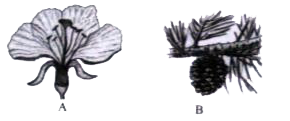Complete Solutions to OLYMPIAD AND NTSE LEVEL EXERCISES of chapter CLASSIFICATION OF PLANTS of Class 9 book with complete answers and questions
| Class 9 | BIOLOGY |
| Chapter | CLASSIFICATION OF PLANTS |
| CENGAGE BIOLOGY | OLYMPIAD AND NTSE LEVEL EXERCISES |
| Number Of Questions | 10 |
| Academic Year | 2023-24 |
You are shown a slide of longitudinal section of male cone of Pinus. You can observe
View SolutionWhich bacterium is capable of utilising the most abundantly available gas in the atmosphere for one of their metabolic pathways, but cannot utilise the second most abundantly available gas for another metabolic pathway?
View SolutionOne of the most important divisions under the Kingdom Planate, gymnosperms are believed to be originated 265 million years ago and flourished in the year in which dinosaurs were predominant. Which era is this?
View SolutionWhich of the reproductive structures in the below pictures is pollinated by wind?

View SolutionMatch the correct pair from column A and column B.

View SolutionLichen is usually cited as an example of symbiosis in plants where an algal and fungal species live together for their mutual benefit. Which of the following will happen if algal and fungal partners are separated from each other?
View SolutionA group of PUC students are appearing for a biology practical examination. One of the practical problems is to identify the slide focused under a microscope. When they observe, they see a structure more or less spherical having an outer most layer which is green in colour and in the middle many of parenchyma cells and a number of skull-shaped bundles are arranged irregularly all around. Help them in identifying the structure properly.
View SolutionA plant shows rhizoids and is haploid. It needs water to complete its lifecycle because the male gametes are motile. Identify the group to which it belongs.
View SolutionWhat happens to the spore after it ejects from sporophytes in pteridophyte plants?
View SolutionAssertion: We cannot classify polytrichum under tracheophytes.
Reason: Because polytrichum belong to the division pteridophyte and they do not possess vascular tissue. Tracheophytes are vasculaturebearing plants.
View Solution
OLYMPIAD AND NTSE LEVEL EXERCISES questions and complete solutions for chapter CLASSIFICATION OF PLANTS of CENGAGE BIOLOGY of Class 9